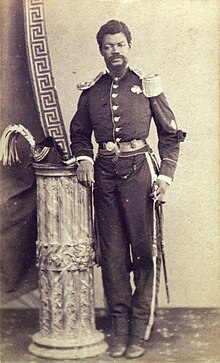Apogee of Pedro II of Brazil
Early life (1825–40) Consolidation (1840–53) Growth (1853–64) Paraguayan War (1864–70) Apogee (1870–81) Decline and fall (1881–89) Exile and death (1889–91) Legacy
The nation experienced rapid development and the emperor was intimately involved in pushing for further progress on a variety of economic and cultural fronts.
The end of the Paraguayan War ushered in what is considered the "golden age" and apogee of the Brazilian Empire.
It was a period of social and political progress where the distribution of national wealth began to benefit a greater part of the population.
[10] But "the emperor, who declared several times his intention to assume direction of the abolitionist movement, as expected, took too long to overcome the political obstacles.
'When he entered the classroom, he went up to him, clapping him on the shoulder, as a demonstration of his immense satisfaction in seeing the way in which a man of the people was striving to learn how to be useful to the country and his family.'
Pedro’s commendable freedom from racial prejudice meant that he did not perceive skin color as a bar to civilization or citizenship."
Pedro despised slave dealers and refused to grant titles of nobility to any of them, including powerful and influential figures at court.
"[24] Eventually, the nomination of the abolitionist[22] and conservative Viscount of Rio Branco as President of the Council of Ministers made possible the passage of the bill, which was enacted as the Law of Free Birth on 28 September 1871, under which all children born of slave women after that date would be considered free.
